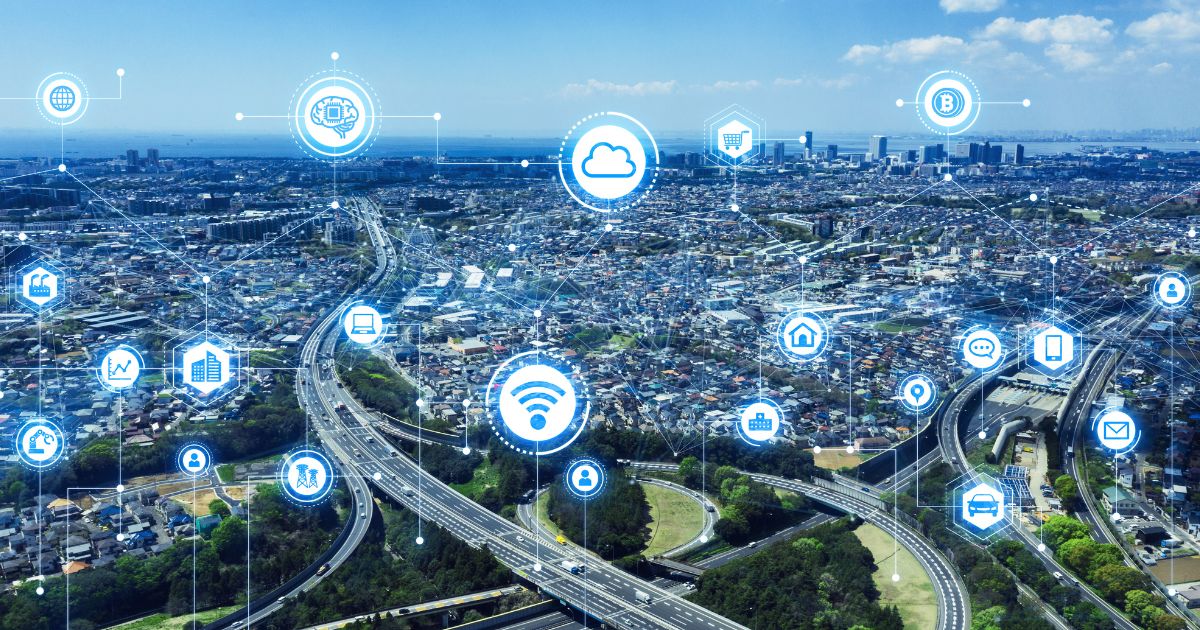- Who We Are
- What We Do
- Success Stories
- Careers
- News & Events
- Contact us

Introduction to Smart Cities and the Role of AI
In response to rapid urbanization, cities worldwide are embracing smart city technologies to enhance quality of life, economic growth, and sustainability. At the heart of this transformation is Artificial Intelligence (AI), which is revolutionizing urban planning, infrastructure optimization, and public service delivery.
AI-driven smart cities leverage data insights to predict, analyze, and solve urban challenges. AI enables cities to forecast traffic congestion, optimize energy consumption, enhance security, and improve disaster management. As urban areas expand, AI offers practical, data-driven solutions, making it an indispensable tool for smart city development.
AI does more than automate processes—it enables city planners to make informed, proactive decisions, leading to sustainable and efficient urban growth. With rising populations and limited resources, AI-driven urban planning is essential to the future of city management.
The Concept of Smart Cities: An Overview
A smart city is an urban area that integrates technology, connectivity, and innovation to enhance operational efficiency, public engagement, and sustainability.
Key Pillars of Smart Cities:
Smart cities are designed to improve service delivery, reduce congestion, enhance security, and create livable spaces using AI-powered technologies.
How AI is Transforming Urban Planning
AI is revolutionizing how cities are planned and managed, offering data-driven insights that were previously unattainable.
AI-driven Urban Planning Innovations:
Example: Cities using AI-driven simulations can predict infrastructure needs and proactively manage growth, reducing traffic congestion and urban sprawl.
Key Components of AI in Urban Planning
Impact: AI-driven data analysis allows cities to address challenges proactively, reduce costs, and build sustainable communities.
The Impact of Digital Transformation on Smart Cities
The shift to data-driven urban management is enhancing efficiency, service delivery, and innovation in smart cities.
Key Digital Transformation Trends in Smart Cities:
Example: Digital transformation enables cities to monitor pollution levels and adjust regulations accordingly, improving air quality.
Sustainable Cities: The Role of AI in Promoting Sustainability
AI is helping cities reduce their environmental footprint while ensuring efficient resource management.
AI-driven Sustainability Initiatives:
Example: AI-enabled smart grids predict energy consumption patterns, leading to lower costs and better sustainability planning.
Smart Mobility: AI-Driven Solutions for Transportation
AI is revolutionizing urban mobility, making transportation faster, safer, and more efficient.
Key AI-Powered Transportation Innovations:
Example: AI-based predictive maintenance in public transport reduces downtime and delays.
Predictive Analytics in Urban Innovation
AI-driven predictive analytics allows cities to anticipate future challenges and opportunities.
Key Applications of Predictive Analytics:
Example: AI-powered simulations help governments allocate resources efficiently and prevent urban bottlenecks.
Smart Governance: Enhancing e-Government with AI
How AI is Enhancing Public Services:
Example: AI streamlines e-Government services, making citizen engagement easier and more accessible.
Case Studies: Successful AI-Driven Smart Cities
Leading Smart Cities Using AI:
Lesson Learned: AI adoption in urban planning leads to smarter, safer, and more resilient cities.
The Future of AI in Smart Cities
Key Trends to Watch:
Final Thought: AI-driven smart cities will redefine urban living, making technology an essential part of sustainable development.
📩 Discover how AI is revolutionizing urban planning. Looking to integrate AI into smart city projects? Get in touch with us today!
